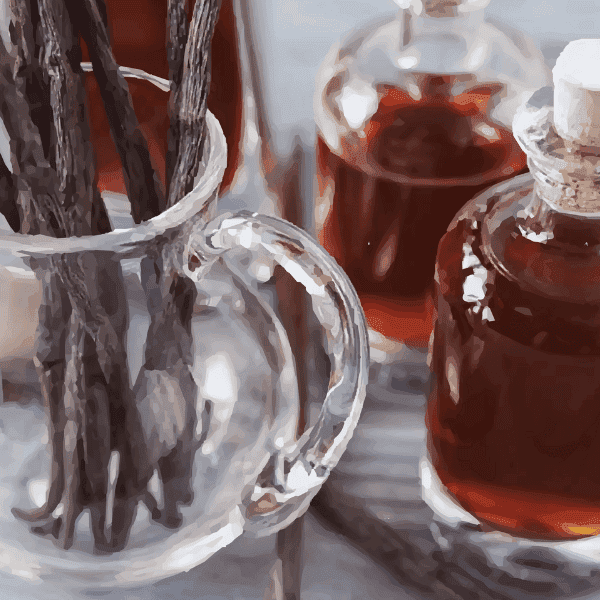
Vanilla oleoresin
Vanilla comes in various forms, such as extract, oil, and oleoresin. Vanilla comes from the vanilla bean of the orchid vines. Vanilla is traditionally used in the culinary arts and self-care like skincare and fragrances. Vanilla is a relaxing scent and can add a light fragrance or taste to things. It also is rich in antioxidants.
You might need vanilla if . . .
- You want to relax
- You want to support healthy cholesterol levels
- If you want a light scent and flavor added to food
Benefits of Vanilla
- Vanilla has a very calming and relaxing scent
- Overall health benefits include cholesterol support, antioxidants, and anti-inflammatory properties.
- It has a light but distinct flavor and scent
- It has antibacterial properties
Common Ways to use Vanilla
- As a fragrance
- In cooking for flavor and fragrance
- As an essential oil
- It is also used in some pharmaceutical preparations
About Vanilla Preparations
Vanilla beans come from the vanilla orchids. The orchids often have their trees to vine on. The growing of the vanilla vines can take around 3 years to hit maturity. Once that happens, they begin to bloom. They only bloom for one day and must be pollinated by hand. This is labor intensive because it must be done when it blooms. After it blooms and is pollinated it will then take 8-9 months for the bean pod to form and be ready to harvest. When ready, these beans/pods are 6-8 inches long.
Processing the vanilla bean: When it is harvested it is then blanched. The blanching activates the enzymes in the vanilla bean, which causes the distinct vanilla flavor. After blanching, they are “fermented” by wrapping them in a wool blanket and putting them in an airtight container. It is taken out daily, laid in the sun, and then put back. This is known as sweating, and it allows the fermentation process to happen. This can take a few months. After that, they are air-dried for 3-4 weeks. After they are dry, they go through the curing process. They are wrapped in wax paper and put into a box for a month. The curing often takes place at the same time as shipment.
Vanilla Extract: The beans are ground into small pieces, exposing the seeds. The beans are cut open to reveal the seeds when making it home. Once exposed, they are then soaked in alcohol to extract the oils from the seeds. Sometimes, heat is used to speed up the process. Though it is not recommended because it destroys a lot of valuable properties. Cold processing takes longer, and the product does cost more but has more beneficial properties. That said, the extract is mainly used in baking, which destroys those properties. Some may say buying the more expensive cold-processed vanilla extract is a waste if planning to heat.
Vanilla Essential Oil: Unlike most essential oils, you cannot use cold pressing or traditional extraction methods. It is often injected with carbon monoxide, and alcohol is also often used to extract oil. There is no such thing as pure vanilla essential oil since additives must be used to extract the oil.
Vanilla Oleoresin: Oleoresins are semi-solid oils extracted from vanilla. They are extremely potent and highly concentrated. They come from Vanilla Orchid pods and are made by removing solvents from vanilla extract. This substance is not suitable for food, candles, or soap as it is not stable. It is typically used in perfumes.
Safety Concerns
Drug Interaction: If you have any health concerns or are taking any prescription medication, please consult with your healthcare provider before adding new herbs to your diet.
Breastfeeding and Pregnancy: There are no known contraindications for breastfeeding and pregnancy.
Other Concerns: There are no other concerns as this is used in food. Be aware of allergies. People who are recovering from alcohol addiction may want to avoid it in its pure form.
Select Studies About Vanilla
Vanilla is primarily used for perfume, food, and pharmaceutical preparations. Research has been done on the curing process and its benefits as soon as it's harvested.
Vanilla has antibacterial properties. It has been on infections that have a resistance to multiple things. Vanilla has also had long term studied health benefits.